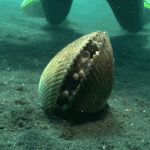CNN reports that Japan will meet with several International Whaling Commission members on Monday, preempting the meeting of the Commission by 3 days:
” Japan’s Ministry of Foreign Affairs and the nation’s fisheries agency will make their case to officials from Angola, Eritrea, Congo, Guinea, Ghana, Malawi, Tanzania, Palau, Micronesia, Cambodia, Laos and Vanuatu, ministry spokeswoman Eri Okabe told CNN. Several of the countries are new to the 78-member whaling commission.
Two months ago, Japan “temporarily halted” its plan for a humpback whale hunt in the seas near Antarctica as what it said was a gesture to enhance the dialogue at the International Whaling Commission, which remains torn over whaling.
Japan, which says it is conducting the hunt as part of scientific research, believes the practice is environmentally and scientifically sound. The country’s annual hunt kills up to 1,000 whales a year — the fisheries agency insists it wants “sustainable whaling.””
Given the history of Japan’s whaling program, I am inclined to agree with Greenpeace that Japan is “wining and dining its way to win votes”. Several of these countries can benefit from negotiations with Japan as they are in the same neighborhood. The african countries I’m sure are interested in increased trade relations. I have no evidence to back it up, but I would make those predictions.





It’s actually standard practice for countries to have bi-, tri-, or multi-lateral meetings with similar delegations prior to meetings of regional fisheries management organizations (RFMOs). Hell, we do the same thing all the time. As for the “wining and dining” behavior, there’s a long tradition within RFMOs of this sort of activity, too. For example, the European Community is famous within ICCAT (the International Commission for the Conservation of Atlantic Tunas) for exchanging the ICCAT votes of African countries with monetary payments for “fishing opportunities” for non-ICCAT species for EC boats. In one sense, maybe we Americans (and, in all fairness, the Canadians too) are just being naive about the whole thing!
However, there’s another point to take home from this, in that strong disagreements can reveal weaknesses within the structures of RFMOs. In the case of ICCAT, one such lesson might be that there’s little to no enforcement unless there’s international trade involved. In the case of the IWC, the lessons might be that countries with neither traditions nor histories of whaling have equal votes with those who do or that there’s still a “scientific research” exemption at all. Just a thought…
I agree, this is old hat on the part of politics. As a people, North Americaners are probably naive about the whole issue. I also find it curious that inland african countries have a say in whaling (or tuna) matters at all.
I could almost support scientific whaling if it was an international effort, hypothesis driven, and the proposal and findings were completely in the public realm. I am guessing though most hypotheses about whale distribution, evolution, ecology, physiology, what have you, do not require large numbers to be killed, or any killed at you. What is their ‘science’? Does anyone know? I am sure tissue samples for whatever questions (DNA, stable isotopes, lipids, pollution/toxin analyses, etc.) suffice just as easily then entire organisms, right?
Amazing that with all the threats to whales out there, people actually still commercially hunt them. Hopefully, the midterm meeting of the IWC in London this week will set the organization on a path for the 21st century. When the IWC was formed, we knew a fraction of what we now know about whales, it’s time for the IWC to be about whale conservation rather than commercial whaling.